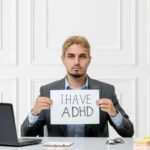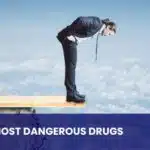Understanding how drugs affect mental health and the nervous system is important to fighting addiction and finding effective treatment. While it can seem simple to identify the drugs that are highly addictive, opinions vary depending on the source.
Even though researchers don’t always agree, most believe that to understand how addictive a drug is, you need to consider many factors. These include its dangers, street price, brain effects, how good it makes people feel, withdrawal signs, and if it can addict someone after just one use. We will use these variables to rank the top ten most addictive substances in the world.

Drug and Alcohol Addiction: The Most Addictive Substances
An estimated 40 million people die yearly from tobacco-related causes worldwide and in the United States. Numbers don’t lie. Every day, smoking claims the lives of over 1,000 Americans, as reported by the National Institute on Drug Abuse.
Alcohol continues to be a source of happiness worldwide because of its lengthy social history. However, around 14.6 million Americans have a problem with alcohol, as stated by the National Institute on Alcohol Abuse and Alcoholism. Alcohol addiction affects 240 million people globally, ranging from very high in Eastern Europe to very low in Asia.
The American Society of Addiction Medicine estimates that illicit heroin and opiate drugs such as fentanyl and oxycodone are responsible for 2.5 million addictions in the US. We could go on and on, but in essence, there are many addictive drugs in the world, and some of the most common ones are on our list.
1. Fentanyl: A Fast Track to Ruin
Of the opioid drugs on the market, fentanyl is perhaps the most potent. The FDA has approved this synthetic opioid medicine for pain relief and anesthetic purposes. It has tremendous therapeutic effectiveness, 100 times more powerful than morphine (and 50 times stronger than heroin).
It is a strong painkiller in medicine, but its illegal use is a big problem worldwide, especially in the US. It is now one of the most dangerous drugs. Sadly, even a little bit can be deadly, adding to the high number of overdose deaths. The fact that fentanyl is found in other addictive drugs like heroin, meth, and cocaine makes the problem even more serious.
From April 2020 to April 2021, there were 100,000 overdose-related deaths. Out of these deaths, 64,000 were caused by fentanyl. Fentanyl is a powerful synthetic opioid that is 80-100 times stronger than morphine.
Fentanyl is the leading cause of death among individuals aged 18 to 45. From April 2020 to April 2021, it resulted in the deaths of 40,010 people in this age group. This number is nearly twice the combined deaths from COVID-19, cancer, car accidents, and suicide within the same age range.
2. Opioid Drugs: The Lure of Euphoria and the Abyss of Addiction
Opioid drugs have powerful pain-relieving properties. While these drugs are great pain relievers, long-term use can also unleash the chains of addiction.
People commonly begin this risky journey with prescription opioids as they try to medicate their physical and emotional pain. However, the body quickly adjusts, increasing the need for higher dosages and the risk of addiction. After stopping the use, withdrawal symptoms worsen, keeping the dependency cycle going.
Heroin: A Deadly Descent into Darkness
Derived from morphine, heroin is a highly addictive and illicit opioid. Heroin works by attaching to its opioid receptors.
It triggers a spike in dopamine in the brain. Dopamine is the neurotransmitter responsible for making people feel good. The brain usually releases dopamine in a controlled way, but addictive substances disrupt this and make dopamine release uncontrollable.
Heroin makes you experience excessive euphoria, followed by feelings of relaxation and tiredness brought on by a slowing of breathing. However, the consequences of addiction to this substance are dire. Heroin addiction harms the body, damages the mind, and consumes one’s life with the constant need for the next high. Getting help as soon as possible is critical to breaking free from the hold of heroin and other opioid drugs.
3. Cocaine: From Elation to Desperation
Crack cocaine, a highly concentrated form of cocaine, is among the most addictive stimulant drugs. It causes a brief and powerful rush of excitement. However, this joy is short-lived, quickly replaced by feelings of sorrow and a strong yearning for more.
Addiction becomes stronger because of the constant ups and downs. Quitting this highly addictive substance often leads to intense symptoms, which often result in starting again.
The toll it takes on the central nervous system (CNS) and the heart is huge, emphasizing the necessity of professional addiction treatment to break free from its grip. The CNS encompasses the spine and the brain, meaning that any change in them affects the whole body and mind.
4. Nicotine: A Legalized Threat to Humanity
Although tobacco products are legal almost everywhere, they hide a subtle but potent addiction. Nicotine, a chemical in tobacco products such as cigarettes, traps consumers physically and mentally with every inhale.
When nicotine stimulates central nAChRs (nicotinic acetylcholine receptors), it prompts the brain to release a range of neurotransmitters, including dopamine. This release of dopamine in the brain occurs within key regions like the mesolimbic area, corpus striatum, and frontal cortex. Dopamine makes us feel good and is involved in addiction. It is released when we use nicotine and other stimulating substances, causing strong cravings and addiction.
5. Crystal Meth: Crystal Clear Danger
Crystal meth (methamphetamine) is among the most addictive stimulant drugs that deliver an instant surge of energy and euphoria that can seem enticing. However, this high comes at a tremendous cost.
Using crystal meth is associated with an increased risk of stroke. It causes an abnormally fast heart rate and elevated blood pressure and can damage the blood vessels in the brain. Long-term use can spiral into inflammation of the heart lining, and overdosing can cause seizures, hyperthermia (abnormally high body temperature), and possibly death.
Crystal meth can also affect your mental health, causing spells of violent behavior, paranoia, anxiety, disorientation, and sleeplessness. The withdrawal symptoms of this highly addictive substance can last a long time. For example, the drug can induce psychotic issues that persist for months or even years after discontinuation.
6. Alcohol: A Legalized Menace
Although alcohol is legal, except for a few Arab nations, its effects on health are anything but benign. Drinking too much alcohol affects the heart rate and nervous system and leads to a harmful cycle of addiction.
The temptation to escape reality or societal pressures can initiate a gradual slide into long-term addiction dependence and even death. Alcohol use and addiction claim 3.3 million lives annually, accounting for 6% of all fatalities worldwide.
7. Benzodiazepines: The Silent Disaster
Benzodiazepines, sometimes called benzos, are classified as Schedule IV restricted drugs. These compounds depress the central nervous system (CNS), slowing its functions and influencing brain activity. Benzos primarily affects brain receptors known as GABA-A (gamma-aminobutyric acid-A). It has a calming effect that helps treat illnesses such as insomnia, anxiety, seizures, panic attacks, and alcohol withdrawal symptoms.
Benzos cause a significant and addictive rise in dopamine levels, like tobacco products, crystal meth, and opioid drugs like heroin. Some people use benzos illegally for recreational reasons. They could ingest them to feel happy or euphoric.
Some people use benzos to self-medicate after misusing substances that raise heart rate and body temperature. Mixing drugs, like crack cocaine, crystal meth, or ecstasy, is a risky practice used to relieve symptoms caused by these substances.
While benzos may offer temporary relief, the body quickly adapts, leading to tolerance and potential substance abuse concerns. Besides, abrupt cessation can trigger severe withdrawal symptoms. This makes professional benzo addiction treatment essential for someone grappling with the side effects of this drug.
8. Methadone: From Treatment to Addiction
Methadone is a common drug used in medication-assisted treatment for addiction to opioid drugs. It has found wide application in treating morphine and heroin addiction.
When taken as directed under medical supervision, the risk of addiction is minimal. However, people who take it for recreational purposes risk developing an addiction. Although methadone has effects similar to those of heroin, coming off it requires a lot of effort and can take up to a month.
Mental health and addiction treatment centers are great places to balance therapeutic use and avoiding addiction. These centers provide close medical supervision and an all-encompassing addiction treatment plan to help ease withdrawal symptoms and fully recover from use.
9. MDMA: From Ecstasy to Desolation
The pursuit of euphoria can transform moments of ecstasy into a prolonged state of desolation. MDMA (Methylenedioxymethamphetamine) is an illegal drug that causes a surge of highs. It increases the heart rate, stimulates the central nervous system, and raises dopamine levels. Effects commence around 20 minutes post-use, lasting 3-4 hours, evoking euphoria, energy, confidence, and heightened affection.
However, extensive usage or concentrated batches may result in floating feelings and hallucinations. Ecstasy addiction can lead to a range of side effects. These include dilated pupils, jaw clenching, sweating, nausea, increased heart rate, anxiety, brain damage, and even death.
10. Amphetamines: Transforming from Cure to Public Health Hazard
Prescription amphetamines like Adderall and Ritalin are often used to treat narcolepsy and ADHD.
Using amphetamines for a long time or for non-medical purposes can result in addiction, withdrawal symptoms, and other negative effects.
- Speech impairment
- Mouth dryness
- Indigestion
- Sleeping problems
- Vertigo
- Cardiovascular problems
Treatment of Most Addictive Substances
Substance abuse and dependency on highly addictive substances like benzos, crystal meth, MDMA, fentanyl, heroin, and other opioid drugs can severely disrupt your life, negatively damaging your physical and mental health and general well-being.
While navigating the difficulties of combating addiction to these substances can be scary, getting help at drug treatment centers can give a lifeline to recovery.
The Vital Role of Drug and Mental Health Treatment Centers
Rehab centers like Rolling Hills Recovery Center play a crucial role in helping individuals break free from the cycle of addiction. We offer structured programs tailored to the specific needs of each individual, providing a safe and supportive environment for recovery.
Comprehensive Treatment Approaches
The Right Environment For Healing
Professional Guidance
Addressing Physical and Mental Health
Hope for a Brighter Future At the Rolling Hills Recovery Center
Knowing the harm caused by addictive substances is key to stopping their control over people. The effects on the body, heart rate, brain, and mental health show the importance of education and treatment for addiction.
If you or someone you know is struggling with addiction, remember that help is available. Treatment centers have experts who can help people overcome addiction and start a new life of recovery and hope.
Seeking addiction treatment at a rehab center is a courageous and necessary step towards a healthier, happier life. It shows a promise to escape addiction and embrace a better future with a new sense of purpose and well-being. Rolling Hills Recovery Center is your drug and alcohol addiction recovery partner.
Our goal is to fight drug abuse and help people recover. We want to provide hope and give you the tools to live a drug-free life. This will benefit your mental health and overall well-being.
Our strategies combine scientifically proven addiction treatment techniques with holistic therapies tailored to your needs. Experience change in a cozy drug treatment environment through our psychologically, environmentally, and socially oriented approach. Please get in touch with us to learn more about the most addictive substances and their withdrawal symptoms, among other things!
Sources
Fentanyl: https://www.dea.gov/factsheets/fentanyl
Social and Cultural Contexts of Alcohol Use: https://www.ncbi.nlm.nih.gov/pmc/articles/PMC4872611/
Benzodiazepines: https://www.betterhealth.vic.gov.au/health/healthyliving/benzodiazepines
MDMA (ecstasy): https://www.healthdirect.gov.au/mdma-ecstasy
Author
-
Dr. Williams has held senior leadership positions in the behavioral health field for over 30 years. He has worked with diverse populations in various private and public sectors.
View all posts
-
Geoffrey Andaria is an experienced mental health content writer and editor. With a B.A. in English and Journalism, Geoffrey is highly educated in freelance articles and research.
View all posts













